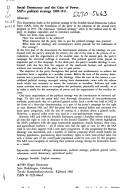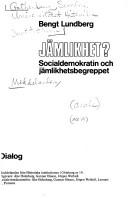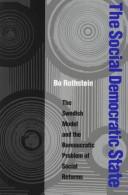| Listing 1 - 7 of 7 |
Sort by
|
Book
ISBN: 9185118427 Year: 1978 Publisher: Stockholm Arkiv för studier i arbetarrörelsens historia
Abstract | Keywords | Export | Availability | Bookmark
 Loading...
Loading...Choose an application
- Reference Manager
- EndNote
- RefWorks (Direct export to RefWorks)
Regional planning --- Sveriges socialdemokratiska arbetareparti. --- Sweden --- Social policy. --- Socialdemokraterna (Political party) --- Socialdemokratiska partistyrelsen --- Parti socialiste suédois --- Shvedskai︠a︡ sot︠s︡ial-demokraticheskai︠a︡ partii︠a︡ --- Sot︠s︡ial-demokraticheskai︠a︡ partii︠a︡ Shvet︠s︡ii --- Švédská sociálne demokratická strana --- SAP (Political party) --- S.A.P. --- Swedish Social Democratic Party --- Swedish Social Democratic Labour Party --- Socialdemokratiska arbetarepartiet (Sweden) --- Social Democratic Labor Party (Sweden) --- Socialdemokratiska partiet (Sweden) --- שוועדישע סאציאל־דעמאקראטישע ארבעטער־פארטיי --- Sveriges socialdemokratiska ungdomsförbund --- Sveriges socialdemokratiska vänsterparti

ISBN: 9172228660 Year: 1985 Publisher: Goteborg Historiska institutionen vid Gotebörgs universitet
Abstract | Keywords | Export | Availability | Bookmark
 Loading...
Loading...Choose an application
- Reference Manager
- EndNote
- RefWorks (Direct export to RefWorks)
Political parties --- -Parties, Political --- Party systems, Political --- Political party systems --- Political science --- Divided government --- Intra-party disagreements (Political parties) --- Political conventions --- History --- Sveriges Socialdemokrat iska arbetareparti --- -History --- Sweden --- Politics and government --- -Political parties --- History. --- Sveriges Socialdemokratiska arbetareparti --- Parties, Political --- Socialdemokraterna (Political party) --- Socialdemokratiska partistyrelsen --- Parti socialiste suédois --- Shvedskai︠a︡ sot︠s︡ial-demokraticheskai︠a︡ partii︠a︡ --- Sot︠s︡ial-demokraticheskai︠a︡ partii︠a︡ Shvet︠s︡ii --- Švédská sociálne demokratická strana --- SAP (Political party) --- S.A.P. --- Swedish Social Democratic Party --- Swedish Social Democratic Labour Party --- Socialdemokratiska arbetarepartiet (Sweden) --- Social Democratic Labor Party (Sweden) --- Socialdemokratiska partiet (Sweden) --- שוועדישע סאציאל־דעמאקראטישע ארבעטער־פארטיי --- Sveriges socialdemokratiska ungdomsförbund --- Sveriges socialdemokratiska vänsterparti

ISBN: 0674020847 9780674020849 067444261X 9780674442610 Year: 2022 Publisher: Cambridge, MA
Abstract | Keywords | Export | Availability | Bookmark
 Loading...
Loading...Choose an application
- Reference Manager
- EndNote
- RefWorks (Direct export to RefWorks)
In addition to revising our view of the interwar period and the building of European democracies, this book cuts against the grain of most current theorizing in political science by explicitly discussing when and how ideas influence political behavior. Even though German and Swedish Social Democrats belonged to the same transnational political movement and faced similar political and social conditions in their respective countries before and after World War I, they responded very differently to the challenges of democratization and the Great Depression--with crucial consequences for the fates of their countries and the world at large. Explaining why these two social democratic parties acted so differently is the primary task of this book. Berman's answer is that they had very different ideas about politics and economics--what she calls their programmatic beliefs. The Swedish Social Democrats placed themselves at the forefront of the drive for democratization; a decade later they responded to the Depression with a bold new economic program and used it to build a long period of political hegemony. The German Social Democrats, on the other hand, had democracy thrust upon them and then dithered when faced with economic crisis; their haplessness cleared the way for a bolder and more skillful political actor--Adolf Hitler. This provocative book will be of interest to anyone concerned with twentieth-century European history, the transition to democracy problem, or the role of ideas in politics.
Socialism --- Marxism --- Social democracy --- Socialist movements --- Collectivism --- Anarchism --- Communism --- Critical theory --- History --- Sveriges socialdemokratiska arbetareparti --- Sozialdemokratische Partei Deutschlands --- Sveriges socialdemokratiska ungdomsförbund --- Sveriges socialdemokratiska vänsterparti --- Socialdemokraterna (Political party) --- Socialdemokratiska partistyrelsen --- Parti socialiste suédois --- Shvedskai︠a︡ sot︠s︡ial-demokraticheskai︠a︡ partii︠a︡ --- Sot︠s︡ial-demokraticheskai︠a︡ partii︠a︡ Shvet︠s︡ii --- Švédská sociálne demokratická strana --- SAP (Political party) --- S.A.P. --- Swedish Social Democratic Party --- Swedish Social Democratic Labour Party --- Socialdemokratiska arbetarepartiet (Sweden) --- Social Democratic Labor Party (Sweden) --- Socialdemokratiska partiet (Sweden) --- שוועדישע סאציאל־דעמאקראטישע ארבעטער־פארטיי

ISBN: 9175040131 Year: 1979 Publisher: Lund Dialog
Abstract | Keywords | Export | Availability | Bookmark
 Loading...
Loading...Choose an application
- Reference Manager
- EndNote
- RefWorks (Direct export to RefWorks)
Civil rights --- -Equality --- Human rights --- -Basic rights --- Civil rights (International law) --- Rights, Human --- Rights of man --- Human security --- Transitional justice --- Truth commissions --- Egalitarianism --- Inequality --- Social equality --- Social inequality --- Political science --- Sociology --- Democracy --- Liberty --- Basic rights --- Civil liberties --- Constitutional rights --- Fundamental rights --- Rights, Civil --- Constitutional law --- Political persecution --- Law and legislation --- Sveriges socialdemokratiska arbetareparti --- Socialdemokraterna (Political party) --- Socialdemokratiska partistyrelsen --- Parti socialiste suédois --- Shvedskai︠a︡ sot︠s︡ial-demokraticheskai︠a︡ partii︠a︡ --- Sot︠s︡ial-demokraticheskai︠a︡ partii︠a︡ Shvet︠s︡ii --- Švédská sociálne demokratická strana --- SAP (Political party) --- S.A.P. --- Swedish Social Democratic Party --- Swedish Social Democratic Labour Party --- Socialdemokratiska arbetarepartiet (Sweden) --- Social Democratic Labor Party (Sweden) --- Socialdemokratiska partiet (Sweden) --- שוועדישע סאציאל־דעמאקראטישע ארבעטער־פארטיי --- Sveriges socialdemokratiska ungdomsförbund --- Sveriges socialdemokratiska vänsterparti --- -Sveriges socialdemokratiska arbetareparti --- Equality. --- Sveriges socialdemokratiska arbetareparti. --- Equality
Book
ISBN: 0801456673 1501704095 1501704087 9781501704086 9780801456671 9781501704093 Year: 2016 Publisher: Ithaca London
Abstract | Keywords | Export | Availability | Bookmark
 Loading...
Loading...Choose an application
- Reference Manager
- EndNote
- RefWorks (Direct export to RefWorks)
Sweden is well known for the success of its welfare state. Many believe that success was made possible in part by the country's ethnic homogeneity and that the increased diversity of Sweden's population is putting its welfare state at risk. Few, however, have suggested convincing mechanisms for explaining the precise relationship between relative ethnic homogeneity/heterogeneity and the welfare state. In this book Carly Elizabeth Schall acknowledges the important role of ethnic homogeneity in Sweden's thriving welfare state, but she argues that it mattered primarily because political elites-especially social democrats-made it matter.Schall shows that diversity and the welfare state are related but that diversity does not undermine the welfare state in a straightforward way. Tracing the development of the Swedish welfare state from the late 1920s until the present day, she focuses on five historical periods of crisis. She argues that the story of Swedish national identity is a story of elite-driven hegemony-building and that the linking of social democracy and national identity colored the integration of immigrants in important ways. Social democracy could have withstood the challenge posed by immigration, but the faltering of social democratic hegemony opened a door for anti-immigrant sentiment. In her deft analysis of the relationship between immigration and the welfare state in Sweden, Schall makes a compelling argument that has relevance for immigration policy in the United States and elsewhere.
Welfare state --- Nationalism --- History --- Sveriges socialdemokratiska arbetareparti --- Sweden --- Emigration and immigration --- Ethnic relations --- Politics and government --- Consciousness, National --- Identity, National --- National consciousness --- National identity --- State, Welfare --- Socialdemokraterna (Political party) --- Socialdemokratiska partistyrelsen --- Parti socialiste suédois --- Shvedskai︠a︡ sot︠s︡ial-demokraticheskai︠a︡ partii︠a︡ --- Sot︠s︡ial-demokraticheskai︠a︡ partii︠a︡ Shvet︠s︡ii --- Švédská sociálne demokratická strana --- SAP (Political party) --- S.A.P. --- Swedish Social Democratic Party --- Swedish Social Democratic Labour Party --- Socialdemokratiska arbetarepartiet (Sweden) --- Social Democratic Labor Party (Sweden) --- Socialdemokratiska partiet (Sweden) --- שוועדישע סאציאל־דעמאקראטישע ארבעטער־פארטיי --- Suède --- Zweden --- Schweden --- Svezia --- Suecia --- Zviedrija --- Shvet︠s︡ii︠a︡ --- Szwecja --- Sverige --- Konungariket Sverige --- Kingdom of Sweden --- International relations --- Patriotism --- Political science --- Autonomy and independence movements --- Internationalism --- Political messianism --- Economic policy --- Public welfare --- Social policy --- State, The --- Welfare economics --- Sveriges socialdemokratiska ungdomsförbund --- Sveriges socialdemokratiska vänsterparti --- スウェーデン --- Suwēden

ISBN: 0822956748 Year: 1996 Publisher: Pittsburgh University of Pittsburgh
Abstract | Keywords | Export | Availability | Bookmark
 Loading...
Loading...Choose an application
- Reference Manager
- EndNote
- RefWorks (Direct export to RefWorks)
Bureaucracy --- -#SBIB:031.IO --- #SBIB:328H2155 --- #SBIB:35H6098 --- Interorganizational relations --- Political science --- Public administration --- Organizational sociology --- Instellingen en beleid: Scandinavië --- Bestuur en beleid: nationale en regionale studies: Zweden --- Sveriges socialdemokratiska arbetareparti. --- Socialdemokraterna (Political party) --- Socialdemokratiska partistyrelsen --- Parti socialiste suédois --- Shvedskai︠a︡ sot︠s︡ial-demokraticheskai︠a︡ partii︠a︡ --- Sot︠s︡ial-demokraticheskai︠a︡ partii︠a︡ Shvet︠s︡ii --- Švédská sociálne demokratická strana --- SAP (Political party) --- S.A.P. --- Swedish Social Democratic Party --- Swedish Social Democratic Labour Party --- Socialdemokratiska arbetarepartiet (Sweden) --- Social Democratic Labor Party (Sweden) --- Socialdemokratiska partiet (Sweden) --- שוועדישע סאציאל־דעמאקראטישע ארבעטער־פארטיי --- Sveriges socialdemokratiska ungdomsförbund --- Sveriges socialdemokratiska vänsterparti --- Sweden --- Kingdom of Sweden --- Konungariket Sverige --- Schweden --- Shvet︠s︡ii︠a︡ --- Suecia --- Suède --- Suwēden --- Sverige --- Svezia --- Szwecja --- Zviedrija --- Zweden --- スウェーデン --- Politics and government --- -Politics and government --- -Social policy. --- -Sveriges socialdemokratiska arbetareparti.
Multi
ISBN: 9188614298 Year: 2000 Publisher: Göteborg Universitet Göteborg. Historiska institutionen
Abstract | Keywords | Export | Availability | Bookmark
 Loading...
Loading...Choose an application
- Reference Manager
- EndNote
- RefWorks (Direct export to RefWorks)
Theses --- Political parties --- Platforms. --- Party platforms, Political --- Platforms of political parties --- Political party platforms --- Political platforms --- Platforms --- Centerpartiet (Sweden). --- European Economic Community --- Sveriges socialdemokratiska arbetareparti. --- Socialdemokraterna (Political party) --- Socialdemokratiska partistyrelsen --- Parti socialiste suédois --- Shvedskai︠a︡ sot︠s︡ial-demokraticheskai︠a︡ partii︠a︡ --- Sot︠s︡ial-demokraticheskai︠a︡ partii︠a︡ Shvet︠s︡ii --- Švédská sociálne demokratická strana --- SAP (Political party) --- S.A.P. --- Swedish Social Democratic Party --- Swedish Social Democratic Labour Party --- Socialdemokratiska arbetarepartiet (Sweden) --- Social Democratic Labor Party (Sweden) --- Socialdemokratiska partiet (Sweden) --- שוועדישע סאציאל־דעמאקראטישע ארבעטער־פארטיי --- Sveriges socialdemokratiska ungdomsförbund --- Sveriges socialdemokratiska vänsterparti --- CEE --- Evropeĭskiĭ Soi︠u︡z --- C.E.E. --- Communauté économique européenne --- Comunidad Económica Europea --- Comunità economica europea --- EEC --- EC --- Europäische Wirtschaftsgemeinschaft --- Europejska Wspólnota Gospodarcza --- Europese Economische Gemeenschap --- Európai Gazdasági Közösség --- EHS --- Kurapʻa Kyŏngje Kongdongchʻe --- Kurapʻa Kongdong Sijang --- EEG --- Evropeĭska ikonomicheska obshtnost --- Evropské hospodářské spolecenstvi --- Comunidade Económica Europeia --- EWG --- Europæiske økonomiske fællesskab --- EØF --- Koinē Agora --- EOK --- MCE --- Mercado Común Europeo --- Europeiske økonomiske fellesskap --- Evropeĭskoe ėkonomicheskoe soobshchestvo --- MEC --- Evropska ekonomska zaednica --- EZZ --- Common Market --- Marché commun --- EĖS --- Avrupa Ekonomik Topluluğu --- AET --- Müşterek Pazar --- Ortak Pazar --- Sūq al-Ūrūbbīyah al-Mushtarakah --- Mercado Comum --- Europaikē Oikonomikē Koinotēta --- Evropska gospodarska skupnost --- Mercato comune --- EEZ --- Evropska ekonomska zajednica --- Euroopan Yhteisö --- EY --- EIO --- Shuḳ ha-Eropi ha-meʼuḥad --- Suq Komuni --- Eurōpaïkē Koinotēta --- Comunidade Européia --- Mercado Comum Europeau --- Unia Europejska --- Koinotēta --- E.G. --- קהילה האירופית --- קהילייה האירופאית --- שוק הארופאי המשותף --- Evropeisku Félagsmarknaðin --- EF --- Centern (Sweden) --- Centerpartiet --- Landsbygdspartiet Bondeförbundet (Sweden) --- Sweden --- Economic policy. --- CEE (European Economic Community) --- C.E.E. (European Economic Community) --- EEC (European Economic Community)
| Listing 1 - 7 of 7 |
Sort by
|

 Search
Search Feedback
Feedback About UniCat
About UniCat  Help
Help News
News